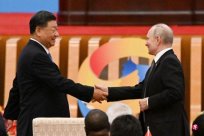Source: Bloomberg
Author: Jennifer Crery
For Taiwan, it is so important to prevent the general interference from the mainland by the mainland, so that many years of qualified voters have been unable to participate in voting for many years.
The reason why many people cannot participate in the voting is that since Taiwan began direct elections in the past 30 years ago, all votes have always been required to be voted by voters themselves.Police officers and medical workers who must adhere to their posts due to this provision.This also means that if Taiwanese citizens living overseas want to vote, they must ask for leave and make a special trip to fly back to Taiwan.According to data from the Taiwan Overseas Chinese Affairs Committee, as of 2022, a total of about 2 million Taiwanese diasporas including children.
However, the advantage of this approach is that it is difficult to penetrate.On the eve of the Saturday election, under the context of the election and the mainland repeatedly reiterated the unified goal of both sides of the strait, the anxiety about the penetration could not be described as the wind.
"Paper votes into the ticket box, and then make some votes in the afternoon, and open the ticket process to the public. This approach is difficult to manipulate," said Margaret Lewis, a professor at the School of Law School of the University of Schipon Holtic University."The more Taiwan is separated from this simple and clear election method, the more the possibility of the trust of the election results is reduced."
The Taiwan government has issued a warning over the mainland's try to influence the election.In December last year, Lin Zilun, a spokesman for the Taiwan Executive Yuan, told reporters in Taipei that eight people were detained for alleged violations of the anti -osmosis law.Prior to the local election in 2022, the Taiwan law enforcement agency searched four places. The three were detained for allegedly participating in the purchase of votes related to the mainland.
Although concerns about external intervention elections are not unique to Taiwan, the lack of complete voting system is a minority internationally.A study by the International Democratic and Election Aid Society on 262 political system found that only 53 requirements were required to vote on the spot, and Taiwan was one of them.
Digital politicians, including the candidate of the party's vice presidential candidate Wu Xinying, called for the amendment to the system.In fact, all major political parties in Taiwan have expressed support.However, there are key differences in their respective reform vision.
For example, the Democratic Progressive Party believes that only voters who live in Taiwan and cannot vote in person to vote can not be voted at all.Li Jinyong, chairman of the Taiwan Central Election Commission, said in 2021 that up to 2 million people in Taiwan will have this qualification.
The Democratic Progressive Party believes that not being open to overseas diaspora will facilitate the opposition of the Kuomintang of the opposition.This view focuses on Taiwanese businessmen living in the mainland, and they are considered to be supporters of the Kuomintang.
Lai Qingde, a DPP candidate for this election, wrote in 2008, questioning whether Taiwanese businessmen can vote for free from free will.On Tuesday, Taiwan's current foreign minister Wu Zhaozheng accused Beijing of providing preferential tickets to encourage merchants to return to Taiwan to participate in voting.
Although the Kuomintang does hold activities in the mainland to fight for support, other parties also seek help from overseas.For example, the Democratic Progressive Party held activities in Southeast Asia, Australia, the United States and Europe in the predecessor of this election.
Xia Liyan, vice chairman of the Kuomintang, said that such activities can help encourage voters to exercise democratic rights; he visited five cities in mainland China last month to support the party's candidate Hou Youyi.He also carefully pointed out in an interview that no one could say that how many people would return to Taiwan to participate in voting.
During the last election in 2020, the return of overseas diasporas did not seem to be unfavorable to the DPP. Tsai Ing -wen won an overwhelming victory, defeating the Kuomintang's Korean Yu with more than 2.6 million votes.In 2016, Cai Yingwen won the greater advantage of 3 million votes in 2016. Although Ma Ying -jeou of the Kuomintang in 2012 defeated Cai Yingwen with less than 800,000 votes.
Despite trouble, many voters still choose to return to Taiwan to participate in voting, although there are no reliable numbers of the specific number.One of them is the 38-year-old data analyst, Hou-Yang Li. He currently lives in New York and decides to spend $ 1,500 (about S $ 1996) to fly back to Taiwan to support the Kuomintang."If it is a election, I usually go back," he said."Local elections."
Some people have made different choices.Daniel Chen, a 34 -year -old telecommunications industry, also lived in New York. He said that it is not easy for vacation to take leave, so he chose to donate 1,000 US dollars to the campaign to the party candidate Ke Wenzhe.He also believes that the number of voters who return to Taiwan to participate in Taiwan will be less than 2020. At that time, the Hong Kong Democratic Games once exacerbated Taiwan's concerns that may face similar destiny.
"The kind of institutional anxiety that China will turn Taiwan into the next Hong Kong is not so strong," he said."We don't think Taiwan will really happen soon."



